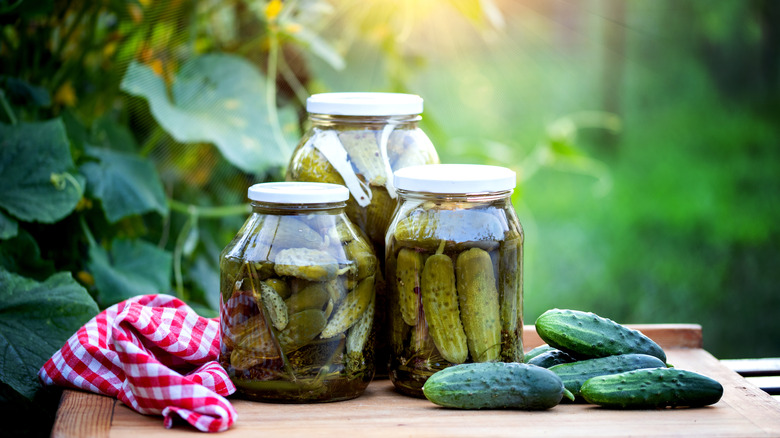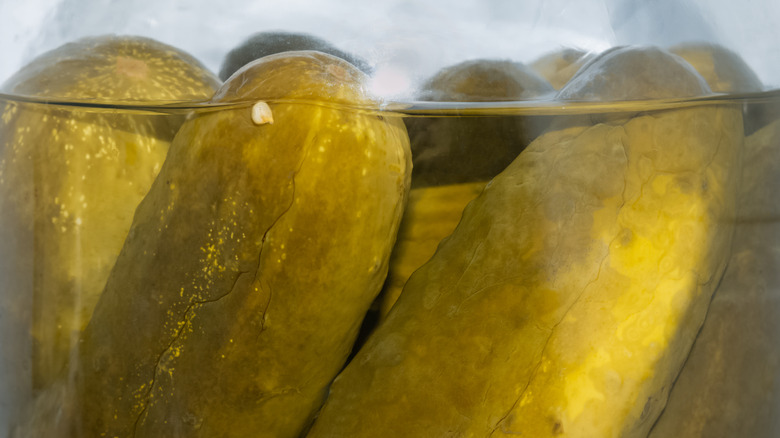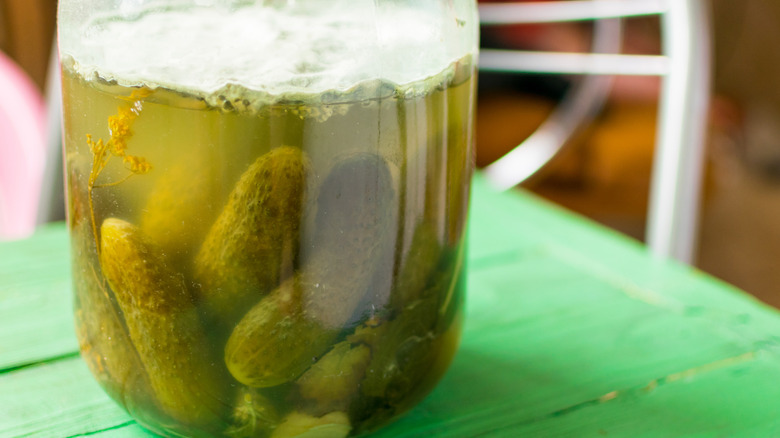How Long Can You Store An Opened Jar Of Pickles On The Counter?
Walk into pretty much any deli and you'll probably see a plus-size jar of pickles sitting behind the counter to garnish sandwich orders — whether they are wanted or not. Seeing pickle jars sitting out in sandwich shops or on the shelf in a grocery store may lead you to think that brine keeps these vegetables safe from spoiling indefinitely, but that is a common misconception. Pickles do indeed go bad, and the question most people need answered is: How fast does that happen?
Unlike something like milk, which goes bad fairly quickly and is very easy to notice when it does, pickles are a little more complicated. An unopened jar of unrefrigerated pickles can sit on a room-temperature shelf out of direct sunlight for two years without having any problems — even if the "best by" date has already passed. This generally holds true for pickles you buy from the refrigerated section of the grocery store and homemade pickles as well, though those should be kept sealed in your fridge at home to make them last.
The difficult part comes in once the pickle jar is opened. After the seal of the jar has been cracked, the pickles can spoil, but this process is slower than with other perishable foods. For example, if opened pickles are kept refrigerated in an airtight container with enough brine to fully cover them, they can easily last for three months.
When pickles go bad
While pickles have a shorter shelf-life after they're opened, that does not mean they are particularly delicate. Pickles brined in a solution with a higher vinegar content are likely to last longer, though any opened jar of pickles will start to show signs of deterioration after a few months. Since they are still submerged in brine, pickles will start to change flavor as they age, becoming sourer. This does not necessarily mean they have gone bad, and sourness does not mean pickles are unsafe to eat — they just may be too unpleasant to actually enjoy.
So what happens if open pickles are left unrefrigerated? Not much, short-term. Refrigeration is necessary to slow the fermentation process of the brine. Faster fermentation means it tastes sour faster, so if you forget to put the pickle jar away after having a midnight snack, don't fret — simply put it back in the fridge in the morning. Similarly, that jar at the deli is probably fine if it is capped because the pickles are used up so fast they don't have time to go bad. Warmer temperatures also make bacteria easier to grow, so to avoid contamination, use gloves or tongs to retrieve your pickles from the jar, and make sure to always check your pickle jar for mold! Moldy pickles are definitely bad and need to be thrown away.
Watch out for these signs of spoiled pickles
Even though opened jars of pickles can last for a while past their expiration dates, they certainly don't last forever because that bacteria and mold will eventually start to grow. You might be able to taste the first telltale signs of pickles that have started to go bad before other signs become noticeable. How so? If you bite into a pickle and it's extra sour or the flavor is not as fresh as before, then it's time to throw out that jar before things gets worse. The same goes for when the texture of the pickles turns soft or mushy.
There are also several visual and olfactory signs of spoiled pickles that you certainly won't want to bite into. If the pickles have a strange odor, meaning they smell different than the dill and vinegar a fresh jar would emit, the pickles have likely gone bad. Look for discoloration or cloudy brine as well. If you see either, then it's time to toss the jar. The last way to check for bad pickles is to look for signs of mold, which will likely be green, gray, or white, and can sometimes look fuzzy.


